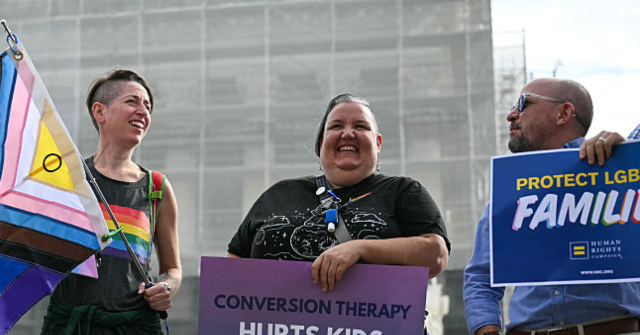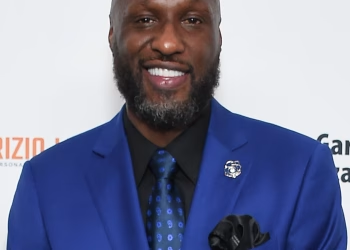The Supreme Court heard arguments Tuesday in a case challenging Colorado’s law requiring an affirmation-only approach for counselors when it comes to sexuality and “gender identity.”
Colorado, along with more than 20 other states, has a law banning “conversion therapy” that was passed in 2019. While the law prohibits archaic and unethical aversion methods historically associated with conversion therapy, such as electroshock therapy, it more broadly prohibits “the provision of professional services for the purpose of attempting to change a person’s sexual orientation or gender identity.” person, including attempting to change behaviors or expressions of self or reduce sexual or romantic relationships.” attractions or feelings towards people of the same sex.
Kaley Chiles, a practicing Christian and licensed counselor who, according to court documents, “believes that people thrive when they live according to God’s design, including their biological sex,” sued the state for violating the law. She argues that the law prohibits her from using talk therapy with clients who voluntarily come to her to help them align their sexuality or their vision of their identity, particularly with regard to minors.
Chiles claims that Colorado prohibits consensual conversations based on expressed viewpoints, in violation of the First Amendment’s free speech clause, and only allows counselors to push minors toward “gender-affirming care,” which includes social transition, sex-reassignment medications, and surgical procedures—methods that are experimental, steeped in ideology, and pushed by large corporations. medical associations.
The conservative 6-3 Supreme Court, which recently dealt major blows to transgender activists pushing for gender changes for minors and LGTBQ+ propaganda in schools, has been asked to decide whether a law that censors certain conversations between counselors and their clients based on the views expressed regulates conduct or violates the Free Speech Clause. Colorado argued that the state’s licensed health care professionals are subject to professional discipline if they provide treatment to patients that is “below accepted standards of care.”
During about 90 minutes of oral arguments, the justices were skeptical of Colorado’s general law and supportive of Chile’s free speech claims, including liberal Justice Elena Kagan.
Justice Samuel Alito was very persistent in his criticism of Colorado Solicitor General Shannon Stevenson’s argument. He first pointed out that the Court rejected a similar argument in 2018 in a case regarding a California law that required pro-life pregnancy centers to provide information about obtaining an abortion.
Alito also presented a hypothetical situation to Stevenson and indicated that he believed the law could result in viewpoint discrimination. He said:
One view is the view that a minor should be able to have talk therapy to overcome same-sex attraction, if that is what they want, and the other is the view that the minor should not be able to have talk therapy to overcome same-sex attraction, even if that is what they want. This seems like blatant viewpoint discrimination.
Stevenson responded by asserting that both scenarios would be permitted by law because the counselor in the hypothetical scenario was not seeking to “change sexual orientation.”
Justice Kagan pressed this point further, presenting Stevenson with a similar hypothesis and remarking that “this looks like viewpoint discrimination in the way we would normally understand viewpoint discrimination.”
In another exchange, Alito pointed out that past “standards of care” imposed by the medical establishment have sometimes proven catastrophically wrong.
“The medical consensus is generally very reasonable and it is very important,” Alito said. “But have there been times when the medical consensus has been politicized, taken over by ideology?
Stevenson responded that politicized medicine is “certainly a concern” but said such evidence was not in the case file.
“Isn’t that a reason to apply First Amendment control when what’s being regulated is pure speech and not just a standard of medical care, a medical consensus?” asked Alito, before referring to the scientific community’s widespread support for eugenics and the placement of people with Down syndrome in psychiatric institutions.
RELATED: Supreme Court to rule on Trump’s executive power, tariffs, trans athletes and more in very consequential term
In an exchange with Justice Neil Gorsuch, Stevenson admitted that the law would prohibit Chiles from trying to help a willing client accept their biological reality, which would ultimately give Chiles the right to sue.
“But if… she wants to help clients who come willingly and – with the desire to change their behaviors, their expressions, their attractions and their identity, then that, that would give her status, right? » asked Gorsuch.
“Identity, yes,” replied Stevenson.
“Okay. So that settles the outstanding issue,” said liberal Justice Sonia Sotomayor.
Several justices expressed during oral arguments that they might send the case back to lower courts for consideration under a heightened form of First Amendment scrutiny, which would not strike down the law but would leave it open to further litigation.
The case is Chilis v. SalazarNo. 24-539 before the Supreme Court of the United States.
Katherine Hamilton is a politics reporter for Breitbart News. You can follow her on @thekat_hamilton.









